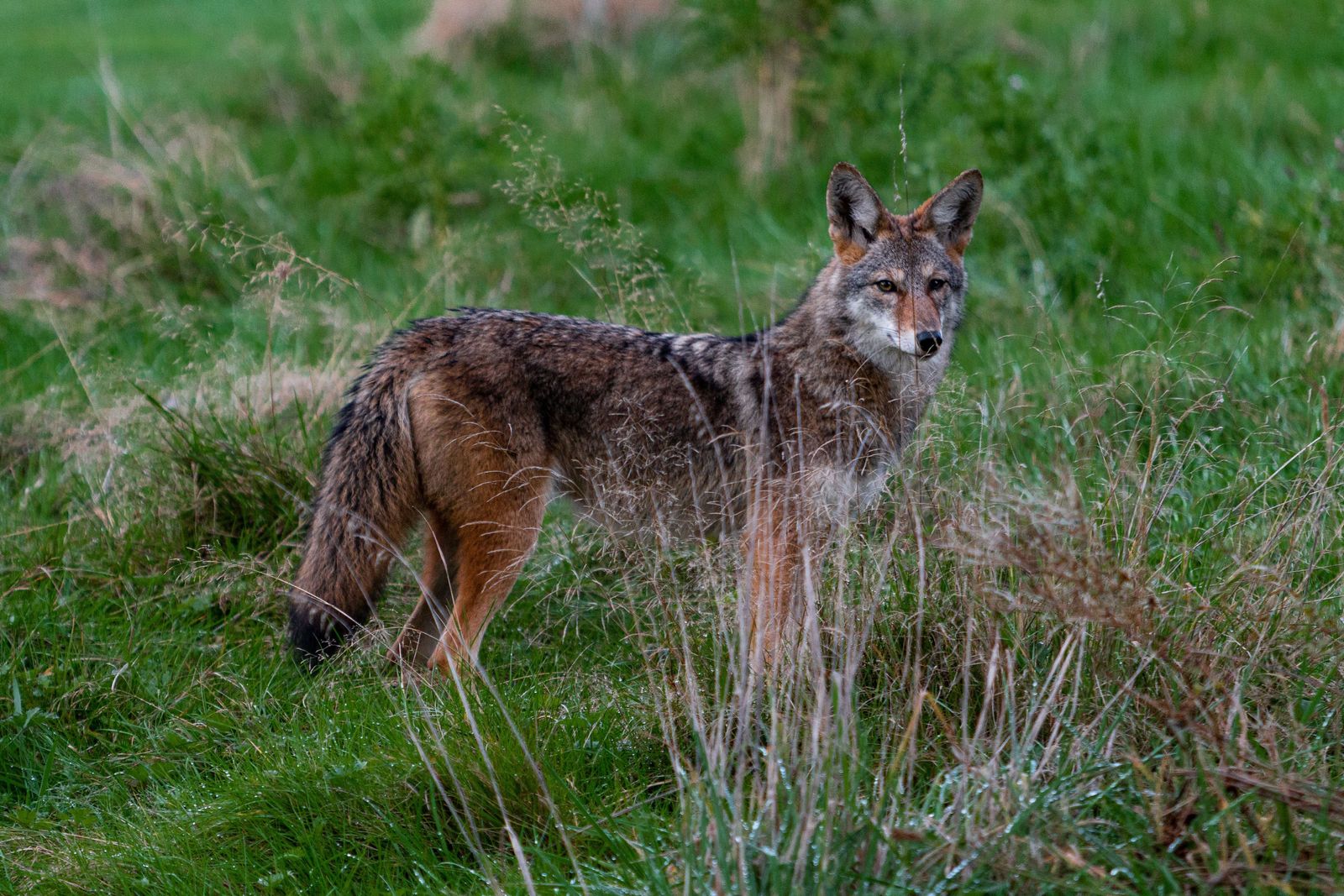How to protect your pets from coyotes

While traveling through some of your favorite dog walking trails you can see that the wildlife habitat is shrinking, while urban sprawl and subdivisions are growing. This is a common theme across North America as we continue developing green spaces. Unfortunately, due to coyotes' limited food sources and their habitat space decreasing, this species wanders into heavily populated areas for food. Coyotes are amazingly resilient and have adapted to live within populated areas. However, since large predators, such as big cats and bears, have been mostly eradicated from populated areas, coyotes have stepped into the void to perform much-needed rodent control and are an essential part of the ecosystem.
Coyotes do not have a specific diet, meaning they can survive off of just about anything. They will eat small mammals, such as mice, rabbits, squirrels, and fawns. They scavenge insects, fruits, birds, amphibians, and reptiles. If a domestic pet, like a cat or dog, or small livestock, such as lambs, are readily available, coyotes will gladly have a convenient little snack. Even though coyotes reside just about everywhere, from Central America to the Arctic, the number of attacks on house pets is very low. While coyotes would prefer their natural diet of rodents and fruit, coyote attacks on pets in urban areas are on the rise. Our job as responsible humans is to learn to live peacefully with coyotes, which includes taking steps to keep our pets safe.
Tips to keep your pets safe!
Here are some easy steps you can take to keep your dogs and cats safe at home and in nature.
- Keep your pets up to date on vaccinations. Even a minor bite from a coyote has the potential to transmit rabies, which is almost always fatal. Keeping your pet current on this important vaccination significantly reduces the risk of catching this disease and simplifies requirements for quarantine and treatment following exposure to a coyote.
- Keep your pets on leash. This is the most important thing you can do to improve your pets’ safety every day, regardless of the hazards present. Short leashes - not the retractable kind - are best for keeping your pet out of harm’s way.
- Do not leave your pets outdoors unsupervised. Coyotes are more active at night, so bring your pets inside before it gets dark. If they do need to go outside at night, go out with them and keep them on a leash or closely supervised within a fenced yard.
- Do not feed your pets outside. This can attract coyotes, and if you feel you must feed them in the backyard, feed them around noon and pick up any leftovers immediately.
- Do not feed wildlife around your home. Bird feeders attract not only birds and rodents, but also the animals that eat them, like coyotes.
- Make your home less attractive to coyotes. Pick up fallen fruit and secure trash bins. Even compost and dirty grills serve as food sources for wildlife.
- Install proper fencing. Your fencing should be at least 6 feet tall and buried 18 inches into the ground, as coyotes are great diggers. As a homeowner, you can put barbed wire at the top of the fence, or PVC pipe, which is hard for coyotes to grip. 4-foot aluminum rods placed at the top of a fence, called coyote rollers, keep especially persistent coyotes out by rolling when they try to climb over. They are attractive and accepted by many homeowners' associations.
- Install motion sensor lights or sprinklers. When these lights or sprinklers come on, they may scare a coyote away. Keep in mind they may also frighten your pets and children as well, so consider your entire family before making an investment.
- Be extra cautious during coyote breeding season. Coyotes are the most aggressive from early spring through late summer while raising their young. When out walking with your pet in coyote-heavy territory, carry whistles and bells on you just in case of a run-in.
It is important to remember that coyotes are naturally timid, curious creatures. If you do encounter a coyote, don’t run away from it as this will incite their predatory chase behavior. Instead, stand your ground and make loud noises, such as clapping your hands and yelling, to discourage the coyote from approaching you and your pet.
What to do if your pet is attacked?
If your dog gets attacked, you should seek immediate veterinary attention for care for the wound as well as to address any important public health concerns. Report coyote attacks or close encounters to your local wildlife agency. Work together as a community if coyotes are a problem where you live to keep the neighborhood as safe as possible for everyone, including the coyotes. Coyotes are a crucial part of North America's wildlife ecosystem, so we must adjust our behavior to keep our domestic animals safe. You can also book an online virtual care appointment to discuss the best way to protect your pets in your neighborhood.










